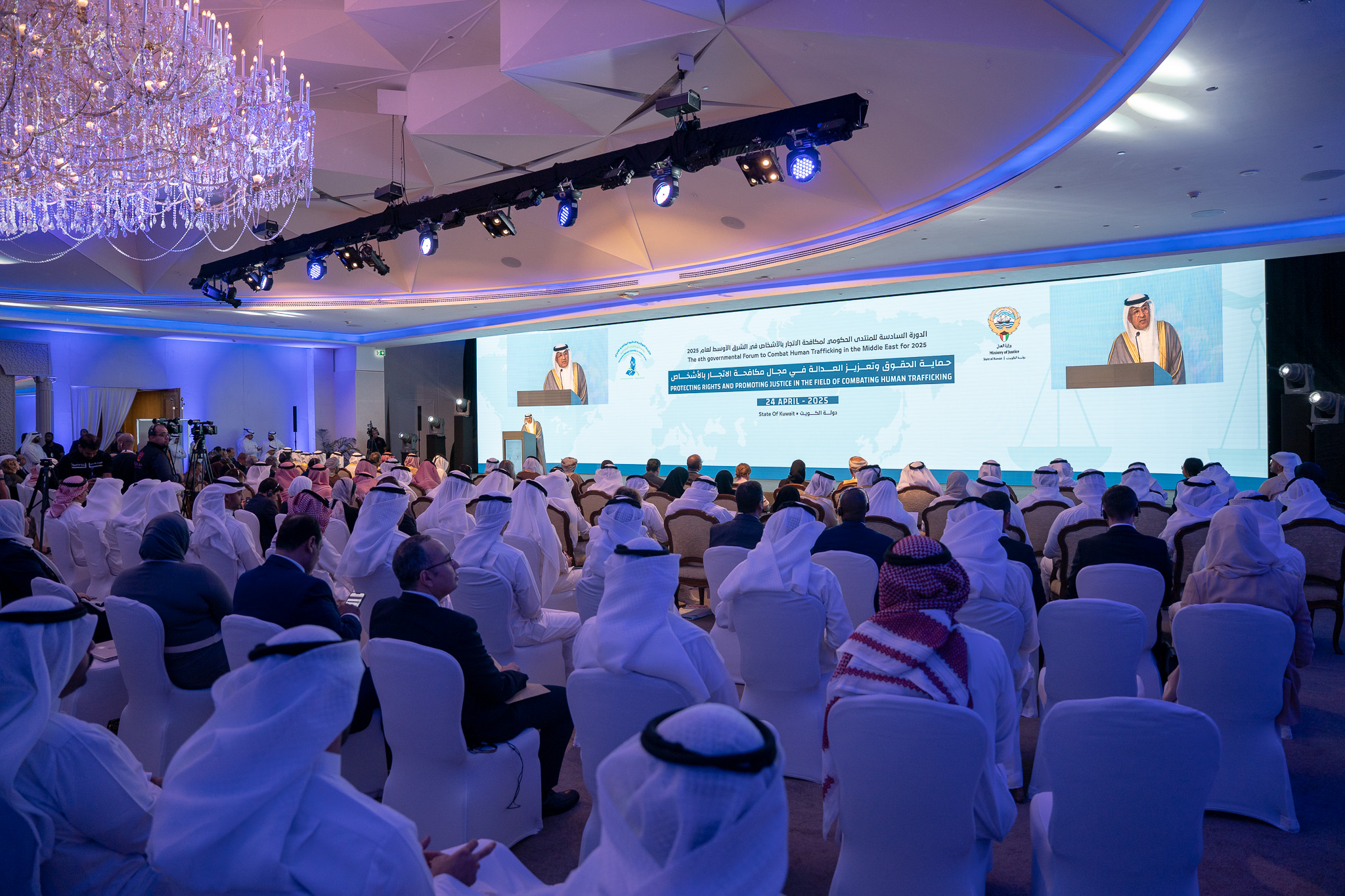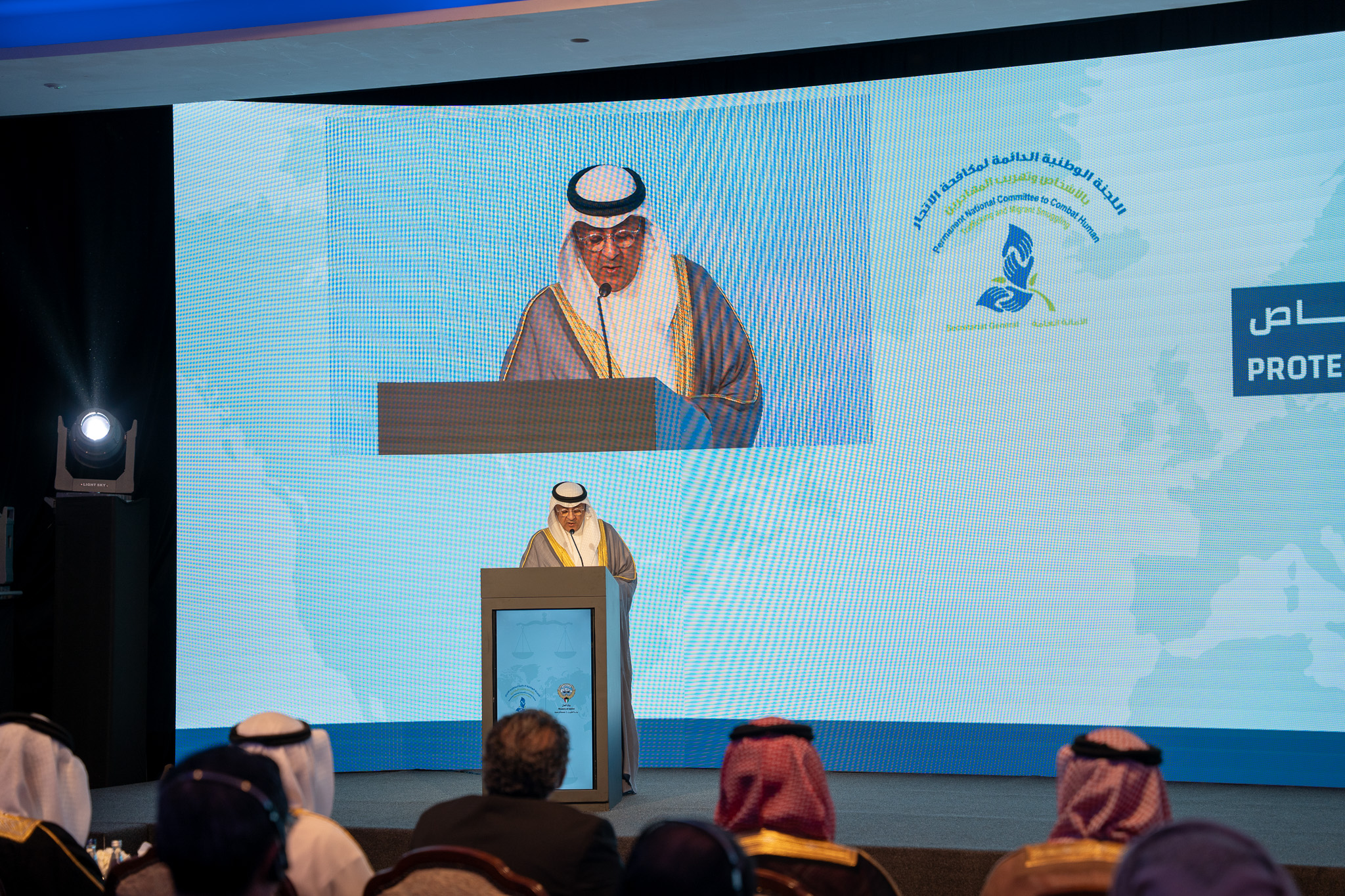His Excellency Mr Jasem Mohamed Albudaiwi, Secretary General of the Gulf Cooperation Council (GCC), stated that the Government Forum to Combat Trafficking in Persons in the Middle East has received regional and international praise for the efforts of the GCC countries, stressing that since its inception, it has contributed to formulating a convergent Gulf vision for combating the crime of human trafficking, based on the economic and geographical specificities of the GCC countries and the challenges facing them in light of the development of this crime's tools and innovative methods, particularly those related to the use of modern technology and transnational organised crime networks.
This came during HE the Secretary General’s speech at the opening of the 6th session of the Government Forum to Combat Trafficking in Persons in the Middle East, held on Thursday (April 24, 2025) in the State of Kuwait. The event was attended by His Excellency Counsellor Nasser Yousef Al Sumait, Minister of Justice of the State of Kuwait, a number of Their Excellencies and high-level representatives from the Forum's member states, and was attended by the General Secretariat of the GCC, the League of Arab States, the United Nations Office on Drugs and Crime, and the United States Department of State.
At the beginning of his speech, HE the Secretary General expressed his deep gratitude to the State of Kuwait for hosting the Sixth Session of the Government Forum to Combat Trafficking in Persons in the Middle East, stressing that this hosting reflects the State of Kuwait's commitment and interest in supporting various human rights issues. He also extended his highest appreciation and gratitude to His Highness Shaikh Meshal Al Ahmad Al Jaber Al Sabah, the Amir of the State of Kuwait, for his great interest and close follow-up of these humanitarian issues.
During his address, His Excellency reviewed the most prominent collective efforts and achievements of the GCC countries in the field of combating trafficking in persons, including the adoption by the Supreme Council of the GCC in its 27th session in 2006 of the Abu Dhabi Document on the Unified Law to Prevent Human Trafficking in GCC. This aims to prevent and end the abuse of human beings in any form of exploitation, he explained.
"Also, the Supreme Council adopted in its 35th session in 2014 the GCC Declaration of Human Rights, which affirmed in Article (3) that +Slavery, servitude, forced labour, and trafficking in persons in all its forms and manifestations, especially those affecting women and children, are prohibited," His Excellency stated, adding: "All GCC countries have ratified the Palermo Protocol to Combat Trafficking in Persons, which is a well-established and major international legal and legislative framework for combating trafficking in persons. They have also issued special national laws that criminalise this crime and establish clear mechanisms for protecting victims and prosecuting perpetrators. In addition, specialised national mechanisms have been established, including the creation of national committees and bodies, the provision of shelters, hotlines, and national referral systems for dealing with potential victims, the training of security and judicial personnel, and the adoption of regulatory reforms in the labour market through the development of legislation regulating expatriate workers, including regulating the relationship between the worker and the employer, as well as strengthening wage protection systems and documenting contracts, in a serious endeavor to reduce manifestations of exploitation in the work environment,"
His Excellency pointed out: "Furthermore, regional and international cooperation has been strengthened with organisations such as the United Nations Office on Drugs and Crime (UNODC), the International Organisation for Migration (IOM), and the International Labor Organisation (ILO) to implement joint preventive and awareness programmes,"
Moreover, His Excellency referred to Resolution No. (Eighth-1) issued by the 10th meeting of the GCC Ministers of Labour Committee, which stipulated assigning the Executive Office of the Council of Ministers of Labour and the Council of Ministers of Social Affairs in the GCC countries to update the joint Gulf vision to combat forced labour and trafficking in persons, in coordination with the team of experts in the field of labour and international relations, and guided by leading initiatives and successful international and regional practices.
Confirming this trend, His Excellency mentioned that the Executive Office will organise a dialogue session on the sidelines of this forum, with the aim of starting the first phase of updating this vision, which is expected to form an integrated Gulf strategic framework that responds to the challenges of reality, keeps pace with the transformations in the labour market and related technologies, and enhances protection and prevention from this crime in all its forms.
Besides, His Excellency noted that: "What has been achieved in our countries is a source of pride and honour, but the magnitude of the challenges and the development of crime patterns require us to redouble efforts, deepen coordination, and sustain collective action among our countries, especially with regard to cross-border crimes or those that exploit vulnerable groups such as women, children, and migrants. The GCC remains committed, with all determination, to supporting all national, regional, and international efforts aimed at eradicating this heinous crime, in order to achieve a just vision that preserves human dignity and protects his freedom,"
His Excellency the Secretary General concluded by stressing the firm and continuous commitment of the GCC countries to combating trafficking in persons in all its forms, developing legislative and regulatory frameworks, and strengthening regional and international cooperation, in a way that ensures the protection of victims, the prosecution of perpetrators, and the consolidation of the values of justice and human rights in our societies.
He underscored that the GCC countries firmly believe that cooperation and the exchange of experiences is the most effective way to address this cross-border crime, and that "We should work together for a future free of exploitation and trafficking in persons,"


